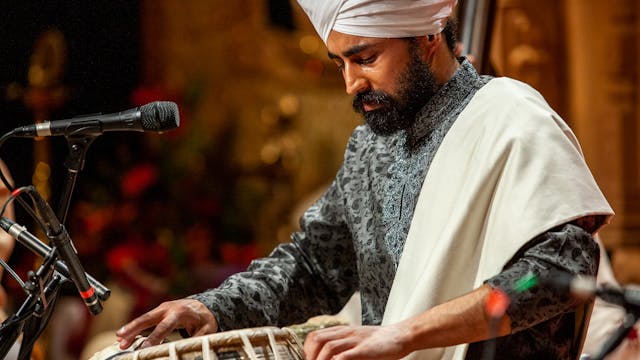Gurdain Rayatt | Tabla Solo
Tabla
•
59m
Recorded at Darbar Festival 2011, on 23rd April, at King's Place, London.
Musicians:
- Gurdain Rayatt (tabla)
- Chinmay Kolhatkar (harmonium nagma)
- Gunwant Kaur (tanpura)
Tabla solo recital in Teental
Playing a tabla solo at the Darbar Festival was not just another concert for Gurdain Rayatt. There sat an intimidating array of artists in the front row of King’s Place, London including Taalyogi Pandit Suresh Talwalkar. They were all Darbar’s artist line-up for the year 2011, senior and acclaimed enough for any young artist’s nerves to fly into a tizzy. All of them were waiting eagerly for the UK-bred Rayatt to begin his performance.
For Gurdain, this concert didn’t just mean delivering a good performance. It came with the responsibility to live up to the name of his grandfather – Bhai Gurmit Singh Virdee – in who’s name, the Darbar Festival was started in 2006.
The latter wasn’t just a great tabla player; He was a prolific teacher who had laid the foundation of Indian classical music in a land so far away from its origin. Rayatt was living up to the legacy of his beloved grandfather, who formed the very backbone of Indian classical music in the UK.
He learnt his art from his father Harkirat Rayatt, one of the most inspirational teachers in the UK. From his teenage, Rayatt received training under Pandit Shankar Ghosh until 2016 when Pandit Ji passed away.
Rayatt begins his solo in the 16-beat teental after paying obeisance to his gurus – his grandfather and Pandit Ghosh. He meticulously plays the introduction, following it up with a ‘peshkar’- a composition that is played at the beginning of a tabla solo recital and contains all the syllables and its improvisations within itself.
Another peshkar follows, this time in a 3 micro-beat structure transposed over the 16-beat cycle. Rayatt demonstrates a steady ability to produce all syllables with crispness and clarity in this piece. A ‘qaida’ (themed composition), again in a 3 micro-beat structure is played where he shows his prowess and spontaneity as a soloist.
Focusing on the open-edged technique of the Delhi gharana and the Farukhabad technique of playing on the middle of the tabla’s surface, Rayatt doles out an age-old composition by Ustad Haji Vilayat Khan (1779-1826), playing both these styles with total abandon.
Thereafter, he pulls the mood to a higher tempo with an astonishing deluge of compositions featuring ‘relas’ (speedy compositions), manja and gats of tabla maestros from the 18th, 19th and 20th centuries and even another composition of his grandfather. With these refined expositions, he produces a spectrum of varied moods and tones with vibrance and drama.
He takes the tenor of his performance to a higher level of imagination with speed, clarity and fluid strokes. Over the years, Rayatt’s career has developed on the solid foundation of traditional tabla from where he has pushed boundaries and collaborated with other genres. His ‘padhant’ (recitation of the bols) composed of intricate syllables and patterns is crystal clear and does not give away his London accent – an astonishing feat to achieve for someone who was born and brought up in the UK and yet so strongly adheres to the grammar of a tradition that is centuries old.
Chinmay Kolhatkar provides a very pleasing nagma throughout the solo, holding it together with tight phrases and a soulful refrain hitting the ‘sum’ (first beat) of the 16-beat cycle with a beautiful flourish each time.
Indian classical music has become a global phenomenon and the astounding number of visitors we have on our digital platforms from all over the world every single day is testimony. However, it cannot be denied that we carry a certain degree of pride in featuring a young, UK-based artist for the Director’s Cut. Rayatt had earned it purely with quality and has encouraged more talented artists in the UK to follow suit.
Up Next in Tabla
-
Surdarshan Chana | Tabla Solo
Recorded at Darbar Festival 2007, on 14th April, at the Phoenix Theatre, Leicester.
Musicians:
- Surdarshan Chana (Benares and Punjab gharana)
- Sandeep Mishra (sarangi)
- Rajveer Singh (harmonium)
- Ranjana Ghatak & Debipriya Das (tanpuras)
Tabla Solo in Teental (16 beats cycle)Surdars...
-
Satyajit Talwalkar | Tabla
Recorded at Darbar Festival 2010, on 2nd April, at King's Place, London.
Musicians
- Satyajit Talwalkar (tabla)
- Milind Kulkarni (harmonium)Tabla in Teental
Raag Gawati, Thaat: Khamaj, Samay: Late AfternoonIn this beautiful recital from 2010, Satyajit Talwalkar introduces his solo perfo...


